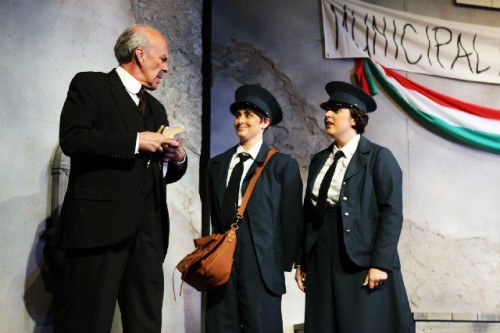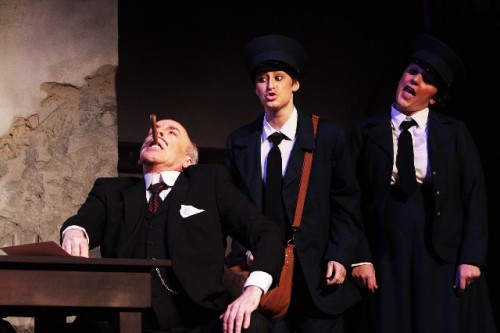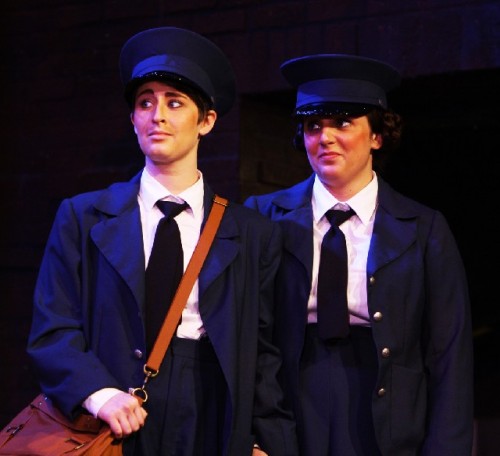Boston Lyric Opera's The Inspector
John Musto Sets Action in Mussolini-era Sicily
By: David Bonetti - Apr 22, 2012
The Inspector
by John Musto
Libretto by Mark Campbell
Conducted by David Angus
Directed by Leon Major
Boston Lyric Opera
Shubert Theatre, Tremont Street, Boston
Performances: April 20, 22 (m), 25, 27, 29 (m)
Production: Set Designer: Erhard Rom, Costume Designer: David O. Roberts, Lighting Designer: Mark Stanley
Cast (in order of vocal appearance):
Dorothy Byrne (Malacorpa), Jake Gardner (The Mayor), Nicole Rudin (Bobachino), Molly Paige Crookedacre (Bobachina), Michelle Trainor (Bombalina), David Cushing (Adolfo), Victoria Livengood (Sarelda, the Mayor’s Wife), Meredith Hansen (Beatrice, their Daughter), David Kravitz (Cosimo), Neal Ferreira (Tancredi), Lee Clarke (Sister Anjelica)
Boston Lyric Opera wraps up its four-production season with a minor hit. “The Inspector,” given here for the first time since its creative team tweaked it after its 2011 premiere at the Wolf Trap Opera in Virginia, is an amusing comedy in the Italian opera buffa tradition. As a sign of its basic success, the audience laughed throughout.
Based on Nicolai Gogol’s 19th century Russian satire, “The Government Inspector,” it has been moved by composer John Musto to 1920s Sicily, when the new Mussolini regime sent inspectors into the countryside in an attempt to combat small town corruption and to break the back of the Mafia, because, Musto writes in a program note, he felt more comfortable with the musical language of the period.
The opera makes for a pleasant evening in the theater, even if it leaves nothing to hum on the way home or much to remember – other than a delirious aria by the mayor’s greedy wife to a vision of shoes, shoes, shoes. Perhaps the BLO blundered by scheduling it so closely on the heels of its recent production of Rossini’s “The Barber of Seville,” arguably the greatest opera buffa ever written. For all its charm, there is no comparison between “The Inspector” and Rossini’s immortal work. (Memo to BLO general and artistic director, Esther Nelson: scheduling a season is a crucial part of the game.)
The story is less nonsensical than many similar comedies – that might be part of the problem - and it makes sharp political observations about government corruption and the seductions of fascism that are applicable to current political events and personalities. (For instance, the crooked mayor says sanctimoniously, “I am not a crook,” and the police chief makes a grandiloquent appeal for torture including water boarding as a matter of Homeland Security.)
The plot is dependent on a case of mistaken identity. The venal and narcissistic mayor of Santa Schifezza (Italiana for trash), panicked by news that the government is sending someone to spy on him and his buffoonish city council, confuses a pair of desperate political dissidents trying to catch a boat in Palermo to the United States with the Inspector and his valet, who he surmises to be traveling in disguise.
Hilarity ensues as they tend to do in such cases, and the cast of stock characters gets plenty of opportunities to reveal their delusions and inadequacies. Complicating matters is the fact that the mayor’s dowdy and humorless daughter Beatrice is a liberal and intellectual who wants to get out of town on the first boat herself.
But, unfortunately, matters are not complicated enough, and the action plays out predictably. I doubt if there was anyone in the theater who was not able to foresee what is supposed to be the surprise final curtain revelation within the first few minutes of the first scene. It also moves rather slowly – Rossini would have included the action of the entire opera in his first act and then in the second act piled on additional complications.
Mark Campbell’s text is stronger than Musto’s music. (They have worked together four times altogether; their first collaboration, “Volpone,” received a fair amount of attention, including a Grammy Award for its live cast recording.) Campbell’s rhyming couplets are a delight, and he might be smart to rewrite it as a spoken play.
Musto’s music is a disappointment. As is typical of current middlebrow American opera practice, he seems incapable of or unwilling to write a genuine stand out aria. I can understand such a refusal from an experimental composer; however, Musto’s music is largely tonal and audience-friendly, and he follows a format that was codified in the 18th century. A few melodious arias and ensembles would have been welcome.
Although he chose to set the opera in 1920s Sicily, there is remarkably little Italian color in the work. The score might be marked with tarantellas, sicilianas and barcarolles, but they are so subtle that I was unable to detect them. (Or they might have been lost in the muffled orchestral sound that is a given at the Shubert. Hence, my inability to report on David Angus’s conducting.)
Yes, there is a lovely, insinuating overture to Act II that invokes film composer Nino Rota, and woodwinds paint a melancholy, fatalistic tone. There is an on-stage band of accordion, tuba and guitar, but more could have been made of them. The work is full of missed musical opportunities.
Tancredi, the student mistaken as the Inspector, and his sidekick Cosimo, his erstwhile violin teacher, sing a paean to Palermo that should be anthemic, but it passes without making much of an impression, although it is reprised with Beatrice joining in. (It was a big risk to write such a piece with Verdi’s “O tu, Palermo, terra adorata” from “I Vespri Siciliani” a pre-existing example.)
Southern Italy was full of popular song during the period. I heard no echo of them, just a uniform timid tonalism. Italian popular music of the time was passionate and tuneful. A passing worker on the streets singing a soulful variation on “o sole mio” or “torna a surriento” would have been nice. It’s a shame Musto didn’t plug into such a lively tradition. Rota did.
The production also lacked sufficient local color. Other than some displays of the Italian tricolor, Erhard Rom’s sets were unspecific. Why he chose to paint the walls of the council chamber green and white, two not particularly Sicilian colors, is baffling. What a sad comparison his work is to Robert Perdziola’s in “Beatrice et Benedict,” Opera Boston’s final production – in that work, set in 1950s Sicily, everything was right - the colors, the sexy but chaste dresses the women wore, the evocation of the Bay of Messina. For the record, Rom was also responsible last year for the ugly set of Opera Boston’s “Cardillac.” Even if they wouldn’t win any prizes, David O. Roberts costumes were evocative of the period.
The cast was dominated by singers from the BLO’s Emerging Artist program, many of whom were fine. First the pros: As the Mayor, veteran bass-baritone Jake Gardner blustered appropriately as a small town Tricky Dick. As his cupiditous wife Sarelda, mezzo-soprano Victoria Livengood, in a nod to Imelda Marcos, shone in her aria, “Shoes, shoes, shoes,” a fantasy about the high-life she will live in Rome when she and her husband are called by Il Duce to take their places there. They shared a memorable moment in a duet to togetherness, their alliance in thievery, murder and depravity, which uncomfortably reminded me of the fascist couple in Bertolucci’s “1900,” who kill a child in a violent sex-act – or to keep it in operatic terms, of Macbeth and his venomous Lady. As Cosimo, the violinist who is fleeing Mussolini with his student Tancredi, local baritone David Kravitz was as professional as he is always.
Among the Emerging Artists, the standout was Neal Ferreira as Tancredi. Handsome and slim, he has a clear, sweet standard-order tenor voice, which are in short supply today. With a little work to better individualize his voice and acting, he could have a big career. As the earnest Beatrice, soprano Meredith Hansen was serviceable. Her voice was a little pinched at the top in her one big aria, a vision of life someplace other than Santa Schifezza that inevitably brought to mind Leonard Bernstein’s “Somewhere” from “West Side Story.” In smaller roles, the cast did what was required. As actors, the various members of the town council: Julius Ahn, Dorothy Byrne, David Cushing and Michelle Trainor collectively created an amusing picture of rural bumptiousness. As the tweedle-dee, tweedle-dum mailmen, Bobachina and Bobachino, Molly Paige Crookedacre and Nicole Rodin, were, respectively, fine.
*#*#*#*#*#*#*#*#*#*#*#*#*#*#
I had intended to review New England Conservatory’s production last week of “Paul Bunyan,” a collaboration between Benjamin Britten and W.H. Auden, but I can’t because I left at intermission.
It had not been a good day. I had had insomnia the night before, and it was Patriots Day, when the thermometer hit 90 degrees. I arrived at the gloriously restored art deco Paramount Theatre, where Emerson College has launched an ambitious program, to find that the air-conditioner wasn’t working. Halfway through the performance, the supertitles stopped working as well. Okay, the opera is in English, but the student chorus didn’t enunciate clearly, and the soprano who sang Tiny, Bunyan’s daughter, seemed to sing without consonants.
But most of all, I hated the opera. Oh, the production was fine. Conductor Stephan Lord led the orchestra with brio. The student cast was charming in its youthful enthusiasm. I liked the set, which was uncredited – did they just find it in the conservatory’s basement or something? – and director James Robinson moved the large cast around efficiently. Baritone James Maddalena spoke the off-stage title role with understanding, having obviously rehearsed, something his former colleague Susan Larson seemed to have forgotten to do in her narration of Mozart’s “La Clemenza di Tito” at Emmanuel Church a few days earlier. (It was a shock to read later that she had indeed written it!)
But the work reeked of smarmy inauthenticity. Both Britten and Auden were British pacifists who sought shelter from combat in New York City during World War II. Some might call them draft-dodgers or even cowards, but that’s beside the point. Here, they opportunistically decided to write an opera on an American myth, the story of Paul Bunyan and his giant blue ox Babe and the lumberjacks who broke the plain or whatever. I wonder if either of them had ever crossed the Hudson River.
An alleged ephebophile, Britten probably just wanted to get a lot of young guys on stage – it was originally written for high-school students. Auden was his stooge. Anyway, there were some nice ditties, some strong choruses – Britten’s specialty – and a welcome light touch. But it was just so damn dishonest I couldn’t take it anymore, so I left and had a delicious bowl of ma po tofu at the Dumpling Café, my favorite place in Chinatown, just a block away.
Oh, btw, when the coast was clear Britten went back to England and wrote an sycophantic homage to the British monarchy, “Gloriana,” upon the ascension to the throne of Elizabeth II, whose survival was ensured by the thousands of young men and women who sacrificed their lives in World War II to defeat Adolf Hitler and the powers of fascism while Britten was sipping white wine in New York. To his credit, Auden became a fervent New Yorker. And “Gloriana” is a wonderful opera, at least when Christine Brewer sings the role of Elizabeth I.





